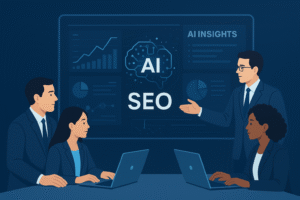
SEO Guide From Beginner to Advance: My Complete Journey
Introduction: Why I Decided to Master SEO
When I first heard about SEO, I honestly thought it was just about adding keywords to articles and hoping Google would notice. But once I started digging deeper, I realized SEO is so much more it’s a mix of art, science, and strategy. I wanted to understand how websites appear on the first page of search results, how businesses attract thousands of visitors organically, and how I could do the same.
That’s when I decided to fully commit myself to learning SEO from beginner to advanced level. This guide is my personal journey, packed with everything I’ve learned and tested over the years. If you’re just starting out, don’t worry I’ll walk you through each step, from the basics all the way to advanced tactics.
Understanding the Basics of SEO
What is SEO and Why Does it Matter?
SEO, or Search Engine Optimization, is the process of improving your website so that it ranks higher on search engines like Google. Think of it like setting up a shop in the busiest street of the internet. If people can’t find you, your business doesn’t exist online.
For me, SEO became the bridge between writing content and actually getting people to see it. Without SEO, even the best content can remain hidden.
Difference Between On-Page, Off-Page, and Technical SEO
When I first started, I learned that SEO has three main pillars:
- On-Page SEO → Things I can control directly on my site, like keywords, content, and internal linking.
- Off-Page SEO → Building credibility outside my site, mainly through backlinks and brand reputation.
- Technical SEO → Behind-the-scenes work like site speed, indexing, and mobile optimization.
Once I understood these three areas, SEO suddenly became less overwhelming it was just about working step by step.
Getting Started With On-Page SEO
Keyword Research (How I Find the Right Keywords)
Keyword research is where my SEO journey truly began. I started using tools like Google Keyword Planner, SEMrush, and Ubersuggest to find what people were searching for. My golden rule: don’t just chase high-volume keywords focus on keywords with intent.
For example, instead of going after “SEO,” I’d target “SEO guide for beginners” or “how to do SEO step by step.” These long-tail keywords brought me more targeted visitors who were actually looking for what I offered.
Writing SEO-Friendly Content
When I first started creating SEO content, I made the mistake of stuffing keywords everywhere. It didn’t feel natural, and honestly, it pushed readers away. Over time, I learned that Google is smarter than that. Today, I write for people first, and then optimize for search engines.
Here’s my process for writing SEO-friendly content:
- Start with search intent – I ask myself, “What exactly is the reader trying to learn or achieve?”
- Use clear headings and subheadings – This makes content scannable and easier for Google to understand.
- Add keywords naturally – Instead of forcing them, I weave them in where they fit.
- Incorporate visuals – Infographics, images, and screenshots make content more engaging.
- End with action steps – I always give readers something practical to do.
The result? Content that people love and Google rewards.
Optimizing Titles, Meta Descriptions & Headers
Titles and meta descriptions are like billboards on Google’s highway. They decide whether someone clicks on my site or not. I make sure my title has the main keyword and sounds compelling. For example:
Instead of “SEO Tips”, I’d write “10 Proven SEO Tips to Boost Your Traffic Fast”.
For meta descriptions, I keep them around 150–160 characters, include the keyword, and give readers a reason to click. Headers (H2, H3, H4) are where I sprinkle secondary keywords to cover more search queries.
Mastering Off-Page SEO
The Power of Backlinks (and How I Build Them)
Backlinks are like votes of confidence from other websites. The more quality sites linking to me, the more Google trusts my content. But here’s the catch it’s not about quantity, it’s about quality.
Here’s how I build backlinks:
- Guest posting – Writing valuable content for other blogs in exchange for a link.
- Broken link building – Finding dead links on sites and suggesting my content as a replacement.
- Networking – Reaching out to other creators and collaborating.
- Creating link-worthy content – Guides, infographics, and statistics people naturally want to reference.
Guest Posting, Social Signals & Branding
Guest posting opened doors for me. Not only did I get backlinks, but I also built relationships and grew my brand.
Social signals likes, shares, and comments aren’t direct ranking factors, but they definitely help spread my content further. The more people talk about my brand online, the stronger my SEO presence becomes.
Technical SEO Essentials
Website Speed & Core Web Vitals
I learned the hard way that a slow website kills SEO. If a site takes more than 3 seconds to load, most visitors leave. I use Google PageSpeed Insights and GTmetrix to test speed, and tools like caching plugins or a CDN to improve it.
Core Web Vitals (loading, interactivity, visual stability) are now ranking signals. I always optimize images, reduce unnecessary scripts, and keep my site lightweight.
Mobile Optimization & User Experience
Since most searches now happen on mobile, Google uses mobile-first indexing. That means if my site doesn’t look good on mobile, I’ll lose rankings. I test everything on both desktop and mobile to make sure navigation feels smooth.
Sitemaps & Indexing
Submitting a sitemap to Google Search Console was one of the simplest but most effective things I did. It tells Google exactly what pages I want indexed. I also check for crawl errors, duplicate content, or pages being blocked by mistake.
Advanced SEO Strategies I Use
Voice Search Optimization
With smart speakers and voice assistants on the rise, I started optimizing for conversational queries. Instead of just “best SEO tools,” I also target “What are the best SEO tools for beginners?”
I write FAQ-style content, use natural language, and aim for featured snippets because that’s where voice assistants often pull answers from.
AI & SEO Tools That Changed My Game
I use tools like SurferSEO, Jasper, and SEMrush to analyze competitors, optimize content, and even predict trends. AI doesn’t replace creativity, but it saves me hours of research.
Local SEO & Google Business Profile
When I worked with small businesses, local SEO was a game-changer. Optimizing a Google Business Profile (adding reviews, images, and correct info) helped businesses show up in the local pack right where customers are searching.
My Step-by-Step SEO Workflow
Tools I Use Daily for SEO Success
Here’s my daily SEO toolbox:
Tracking Progress with Analytics & Search Console
Every week, I check my analytics. I look at which keywords I’m ranking for, how much organic traffic I’m getting, and what pages are underperforming. Then, I tweak and optimize based on the data.
Common SEO Mistakes I Learned to Avoid
- Stuffing keywords instead of writing naturally
- Ignoring mobile users
- Buying cheap backlinks (this hurt my site in the past!)
- Not updating old content
- Forgetting about user experience
Future of SEO: Where I See It Going
SEO is evolving fast. I believe the future will focus more on AI, personalization, voice search, and user experience. Instead of just optimizing for Google, we’ll be optimizing for the way people search across devices, apps, and platforms.
FAQs About SEO Guide From Beginner to Advance
1. How long does it take to see results from SEO?
From my experience, it usually takes 3–6 months, depending on competition and effort.
2. Do I need to know coding for SEO?
Not really. A basic understanding helps, but tools make most of it easy.
3. Is SEO better than paid ads?
Both have their place. SEO gives long-term results, while ads are instant but costly.
4. How many keywords should I target per page?
I focus on one main keyword and 2–3 related ones per page.
5. Can I do SEO by myself without hiring an agency?
Absolutely. I started solo, and many people do. It just takes consistency.
6. What’s the most important ranking factor?
In my opinion: quality content that satisfies search intent.
Conclusion: My Final Thoughts on SEO Mastery
Looking back at my journey, SEO seemed like a mountain at first. But by breaking it down on-page, off-page, and technical it became manageable. The more I practiced, the more confident I got.
If you’re starting your SEO journey, my advice is simple: don’t rush. Learn the basics, test strategies, track your progress, and stay updated with changes. SEO isn’t about quick wins it’s about building something long-lasting.
And trust me, once you see your website climbing up the rankings, all that effort feels worth it.
Also Read: The SEO Tool You Must Have to Grow: Unlock Explosive Online Success




















Post Comment